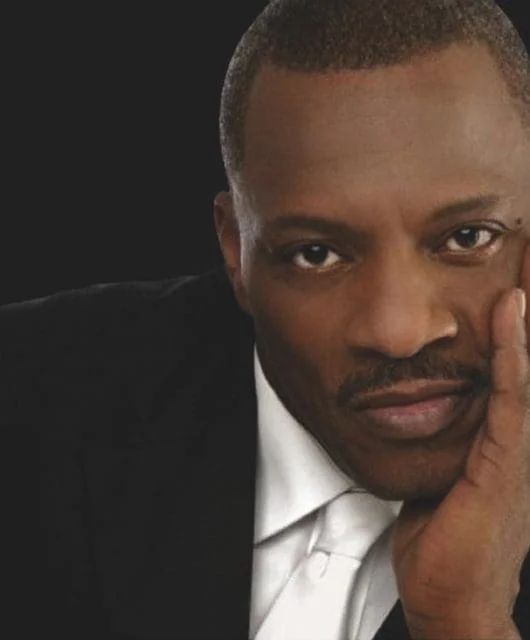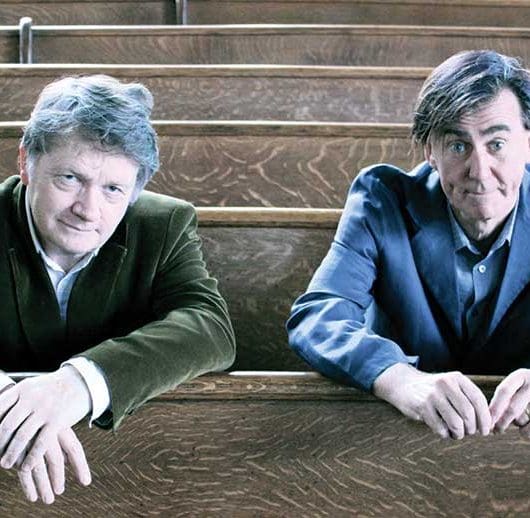George Michael albums – the complete guide
By Steve Harnell | January 24, 2022
The pre-eminent songwriter of his era, the albums of George Michael demonstrated that sometimes, less was definitely more…

Faith
Released 1987
Label Columbia/Epic
Chart Position UK No.1 and US No.1
Few, if any, artists have made the transition from teen idol to mature solo artist in the way George Michael managed with debut album, Faith.
As a showcase for the diversity of his songwriting, it was impeccable – Faith seamlessly moves through the gears of tough R&B, homage rock’n’roll, soulful balladry and sparkling electro-pop.
By the time George called time on Wham!, he’d already proved himself as a sophisticated balladeer with Careless Whisper and A Different Corner while a subsequent hook-up with Elton John and an emboldening duet with Aretha Franklin showed that Michael was now elevated to the heights of the music world’s biggest stars.
As a statement of intent about his new direction, the audacity of making I Want Your Sex the first single from Faith remains impressive. While its plea for monogamy was lost in translation amid George’s sexualised grunting, the song still gave the star a No.3 hit in the UK singles chart and enough notoriety to make the biggest of media splashes.
But Faith’s nine songs were far more than a button-pressing exercise in baiting the Establishment; its opening title track is an irresistible slice of upbeat 50s-influenced rock’n’roll – intro’d by a church organ playing the refrain of Wham!’s Freedom – the death knell on his former life had been sounded.
Essentially a Bo Diddley homage with a wonderfully concise rockabilly-style twanging guitar solo, by the end of 1988 Faith was the biggest-selling single of the year in the US.
Similarly styled to stress the move away from his teen idol image, the hushed Father Figure details a man in turmoil; by now, Michael was beginning to write more personal lyrics. The song explains his confusion over his sexuality: “That’s all I wanted/ But sometimes love can be mistaken for a crime.” A tastefully arranged gospel choir add nuance to one of George’s best ballads.
The centrepiece of Faith remains the ambitious I Want Your Sex Pts 1 & 2, a nine-minute epic split into three acts (Lust, Brass In Love and A Last Request). Its funky second half doffs its hat to horn-infused Philly Soul and even includes a brief Italo House-style breakdown.
Few artists could tread into genuinely emotive tear-stained soul like George without resorting to mawkish over-sentimentality but his visceral examination of a fractured relationship on One More Try still sounds astonishing from the pen of someone aged only 24.
Taking a leaf out of Prince’s book and his alter-ego Camille, Michael then seamlessly tweaks his vocals to duet with himself on the electro-funk of Hard Day, before returning to more serious territory for Hand To Mouth‘s social commentary.
The track’s story of two Americans, a prostitute and 25-year-old Jimmy who embarks on a shooting spree, remains sadly pertinent more than 30 years later. Equally hard-hitting is Look At Your Hands, a bluesy song about domestic violence dating back to George’s Wham! days.
After George was impressed by Janet Jackson’s Nasty, Jam & Lewis were asked to remix Monkey for its single release but the album version here is less gimmicky and more cohesive.
By closing ballad Kissing A Fool, Michael’s transformation was complete and global stardom assured. Faith was a masterpiece straight out of the box.
Read more: Making George Micheal’s Faith

Listen Without Prejudice Vol. 1
Released 1990
Label Columbia/Epic
Chart Position UK No.1 and US No.2
If one of Faith’s trump cards had been the provocative way it set out George’s stall as a sexed-up mature artist, Listen Without Prejudice Vol 1’s title alone was wilfully confrontational – an assured (and perhaps a little narked) dig at critics who still saw him as pop product. After spending his post-Faith years hiding behind sunglasses, George recoiled from the glare of the public eye and sought solace in his most introspective collection of songs to date.
Stung by the backlash after winning two gongs at the American Music Awards, remarks that he was a black music interloper cut deep. After all, as an avowed soul music fan, he’d been celebrating, not exploiting black music, since his earliest Wham! days.
And soul influences are still brought to bear at points in LWP. This time, though, further stylistic shifts are added to the mix including the social commentary anthemics of John Lennon on the beautiful, stately opener Praying For Time.
A heartfelt plea for socio-economic parity amid widespread antipathy (“Charity is a coat you wear, twice a year”), it’s one of George’s finest songs, his own Imagine. Heal The Pain flips the influences to the melodic heart-on-the-sleeve balladry of McCartney. George and Paul eventually re-recorded it in 2005 for the Twenty Five compilation.
While the majority of LWP is downbeat, the urgent Funky Drummer-sampling Freedom! ’90 is arguably George’s most irrepressible dance anthem. Very knowing, its self-referential story looks back poetically at his Wham! days, simultaneously underlining his new mission statement (“Today the way I play the game has got to change, oh yeah/ Now I’m gonna get myself happy”).
Meanwhile, George’s growing maturity as a vocalist is best evidenced in the virtuoso cover of Stevie Wonder’s They Won’t Go When I Go, which even manages to improve upon the original. No mean feat.
If we feel that we’ve been put through the emotional wringer by that then there’s a little respite on the acoustic string-laden ballad Something To Save, equally introspective but with a little lighter touch.
The seven-minute jazzy Cowboys And Angels saw George further move outside the conventions of the three-minute pop format although, despite itself, George’s inherent pop savviness can’t resist returning to the Funky Drummer loop for the second time on Waiting For That Day. Soul II Soul are undoubtedly the touchstone for the percussive Soul Free, which for once here is more about the groove than the lyrical content.
But sadness is at the heart of Listen Without Prejudice. Mother’s Pride, a heart-wrenching ballad about those whose lives have been torn apart by military conflict struck a chord with those families affected by the Gulf War of 1990/91.
Read more: Making George Michael’s Listen Without Prejudice

Older
Released 1996
Label Virgin
Chart Position No.1 and US No.6
Personal tragedy dominates the behind-the-scenes genesis of Older where the world-weary worries of LWP have changed into tangible grief.
Synthesised electronic flourishes are woven throughout Older but the overall ambience here is more organic than its predecessor. Brazilian composer Antônio Carlos Jobim is name-checked in the liner notes – the man who brought The Girl From Ipanema to the world – and influences Older’s jazzier inflections.
But more fundamental to the project is the shadow cast by George’s late partner Anselmo Feleppa who died in 1993. Reeling from the tragedy, George poured himself into writing opening ballad Jesus To A Child. Themes of grief and mortality are threaded through Older’s tracklisting with the title song a knowing look at the passing of time.
A master at writing in varying styles, Michael keeps the arrangements diverse throughout, after the sweeping string-infused opening ballad comes the dancefloor-friendly Fastlove, an ode to cruising which George described as being about “covering my pain, blunting out that pain with fast love.
There’s not one track on the album that’s not about Anselmo or the threat of AIDS.” More certain of its point of view is the trip-hop lope of Spinning The Wheel, a clear-cut warning of the dangers of promiscuity.
The stripped-back beatbox-driven It Doesn’t Really Matter is atypically sparse and gives George’s vocal room to breathe. It’s a hushed R&B ballad with a subtle nod to Bacharach and David’s (There’s) Always Something There To Remind Me (George has a habit on Older of dropping in sly samples; Fastlove also includes a dash of Patrice Rushen’s Forget Me Nots).
Maintaining the eclecticism, The Strangest Thing has a delicate World Music vibe while George returns to Bacharach songcraft for the 60s pop of To Be Forgiven, although its self-lacerating lyrics are at odds with its summery arrangement.
Amongst the overarching despair, Move On is a supper club anthem of defiance and Star People is equally spirited; a case of George distancing himself from the showbiz pack who feel compelled to seek fame as a means to fill the hole of an unhappy childhood.
It’s only fitting, though, that Older leaves us on a poignant note. Revisiting the theme of an unloving God that Michael touched upon in Praying For Time, the measured tone of You Have Been Loved is an ode to humanism in a cruel world.
Read more: Making George Michael’s Older

Songs From The Last Century
Released 1999
Label Virgin
Chart Position UK No.2 and US No.157
Covers albums have long been viewed as the last refuge for those songwriters whose muse has deserted them. While it’s true that George used this as a stopgap between Older and the long-in-gestation Patience, such is the variety of source material on offer here that Songs From The Last Century makes for an unusual and rewarding runt in the Michael litter.
Essentially a showcase for George’s abilities as a singer and arranger, these 10 jazz songs range from straightforward covers to more intriguing refits of, among others, The Police, Roberta Flack and U2 side project Passengers.
The covers are impeccably chosen, of course, and not without pertinence to the rest of Michael’s traditional songwriting concerns. His emotive retelling of Great Depression-era standard Brother, Can You Spare A Dime? (George was a lifelong critic of social inequality and a philanthropist throughout his career) is especially pointed. Equally, a hushed reboot of The Police’s Roxanne is an anti-prostitution plea wrapped in a love song.
Produced by George and veteran Phil Ramone – the latter had worked with everyone from Dylan and Elton to Sinatra, McCartney and Ray Charles – lush orchestrations underpin the vocals here but never overpower them.
George has fun with Nina Simone’s My Baby Just Cares For Me, replacing the smile of Lana Turner for the toothy grin of Ricky Martin, while there’s a reverential treatment given to The First Time Ever I Saw Your Face, made famous by Roberta Flack. The tenderness of Michael’s delivery is quite breathtaking, there’s no grandstanding or flashiness, just a singer purely serving the emotion of the song.
The one major surprise here is the inclusion of Miss Sarajevo, the only single released by U2 and Brian Eno side project Passengers, which originally featured a guest vocal from Luciano Pavarotti. It’s reportedly Bono’s favourite self-penned song and obviously grabbed Michael’s attention, too.
Its mixture of spiritual and pop cultural lyrics are Bono’s way of portraying the dichotomy at the heart of those living through the conflict in Sarajevo during the 1990s: “Is there a time for first communion? A time for East 17? Is there a time to turn to Mecca? Is there a time to be a beauty queen?”
Equally impressive is the recasting of I Remember You – did George know the track from the movie The Fleet’s In sung by Dorothy Lamour or the cheesy 1960s pop song by yodelling Aussie Frank Ifield?
Secret Love (“My secret love’s no secret any more”) is, of course, dripping with meaning since George’s coming out but he doesn’t labour the point here, merely sounding joyous about it. Nina Simone’s influence also reappears for Wild Is The Wind, Michael’s version far more restrained than the extravagant David Bowie cover found on Station To Station.
Don’t skip over this outlier in George’s back catalogue.
Read more: Top 40 George Michael songs

Patience
Released 2004
Label Sony Music
Chart Position UK No.1 and US No.12
At 14 tracks and 70 minutes long, Patience was George’s most expansive project. Five long years in the making, the star’s fifth and final studio album of new material was an uncompromising affair.
Its opener, the mournful title track ballad was written and recorded on the same piano on which John Lennon wrote Imagine (George bought it for £1.6 million and put it on display for Beatle fans); fitting for the man who penned the equally anthemic Praying For Time.
While there’s often a bleak outlook at the heart of Patience, there are flashes of hope, too. The breezy acoustic-led dance track Amazing paid testament to the way that new partner Kenny Goss had turned George’s life around following the death of Anselmo.
As an expression of the bereavements that George suffered later in life, Patience’s contents often touch on the theme of mortality in the face of an unloving God; Cars And Trains’ intro shows, though, that even through tragedy, the songwriter retained his black humour: “Hello, you’ve reached the afterlife message centre/ The God you are trying to reach is not available to take your call.”
Equally questioning of the idea of life’s randomness and the brutality of fate is John And Elvis Are Dead; George’s long-standing battles with depression may be alluded to, too, with the line: “I’m thinking about asking the doctor if he could put me back to sleep.”
Its main refrain of “If Jesus Christ is alive and well, then how come John and Elvis are dead?” is proof perhaps of a man who has given up on religion. There’s a lot of pain inside the bruised heart of Patience.
If Michael is in philosophical mode throughout much of the album, his knack for button-pushing controversy still bubbles to the surface on the sexualised raunch of Freeek! ’04 and Shoot The Dog – threading The Human League’s Love Action (I Believe In Love) the latter manages to be a thoroughgoing critique of his own weaknesses set against well-aimed political pot-shots at Tony Blair and George W Bush.
Patience’s use of samples and reinterpretations continues on Flawless (Go To The City), which utilises US dance act The Ones’ Flawless as its foundation. It’s a rare slice of undiluted upbeat pop here.
More representative of the overall tone is My Mother Had A Brother, George’s heartbreaking tale of an uncle who died tragically on the day that the singer was born. Michael drafted in James Bond composer David Arnold to score Through and there are further Bondian references with a sample of John Barry’s Moonraker theme in Please Send Me Someone (Anselmo’s Song).
Once more, the LP was mined for singles – there were six releases in all – three of which made the Top 10 in the UK and the LP went on to healthy sales of more than four million. George was still a global player.
Read more: Making George Micheal’s Patience

Symphonica
Released 2014
Label Virgin EMI
Chart Position UK No.1 and US No.60
George’s final tour, the two-leg 67-date Symphonica jaunt saw him mix tracks from Patience, Songs From The Last Century and one-off covers.
The album of the same name merges studio-recorded orchestral arrangements with Michael’s vocals at the Royal Albert Hall stop-off on the tour. He’s in relaxed form throughout, now much more at ease on stage than in his fraught late-80s and early-90s chart heyday.
His cover of Nina Simone’s My Baby Just Cares For Me is melodic, frothy fun but the emotional heft of these orchestral reworkings is best seen in the wonderful A Different Corner and powerful Praying For Time with George altering the lyrics to “I sang 20 years and a day, but nothing changed/ The human race found some other guy and walked into the flames.”
A well-chosen cover of Terence Trent D’Arby’s Let Her Down Easy is a beautiful wild card while a vocal showcase of Anthony Newley standard Feeling Good puts the bombast of Muse’s bloated take in the shade.
Equally intriguing is the rescue job he does on Elton John’s Idol, a by-now largely forgotten track on his 1976 album Blue Moves; its lyrics fit Michael’s defiant nature like a glove (“Bulldog stubborn, born uneven/ But don’t bet them, they can’t take him to the very bottom”).
Dedicated to his mother and Anselmo, You Have Been Loved is another emotional high point of the show. Changed little from the original studio incarnation, its elegant melody is well served by a sympathetic backing.
Reaction to the record was mixed. The Guardian called it “a slightly confused live album”, while Pop Matters labelled it “a heady, luxurious soirée.”
As a reminder of George’s vocal mastery, Symphonica more than earns its keep although the recent release of the MTV Unplugged show with the reissue of Listen Without Prejudice arguably features a much stronger setlist while also showcasing his skill at reworking his own material.
On MTV Unplugged, key solo cuts such as Freedom! ’90 and Fastlove nestle alongside prime Wham! track Everything She Wants. There’s also the bonus on the CD of the unreleased Fantasy, boasting a trademark choppy guitar accompaniment from Chic’s Nile Rodgers.

Five Live EP
Released 1993
Label Parlophone
Chart Position UK No.1 and US No.46
It is testament to what a remarkable artist George Michael was when you realise he pulled out one of the finest live performances of his career with the news that his partner Anselmo had been diagnosed with HIV still ringing in his ears.
He channelled that pain (and worry about his own health status) into this celebration of Freddie Mercury’s life at the Queen’s frontman’s 1992 memorial concert. His version of Somebody To Love is quite extraordinary and a duet with Lisa Stansfield on These Are The Days Of Our Lives equally moving.
Also superb are the sympathetic covers of Seal and Adamski’s Killer and soul gem Papa Was A Rollin’ Stone by The Temptations recorded at a separate Wembley Arena date.
Read more: Betty Boo interview
Read more: Top 20 side projects






